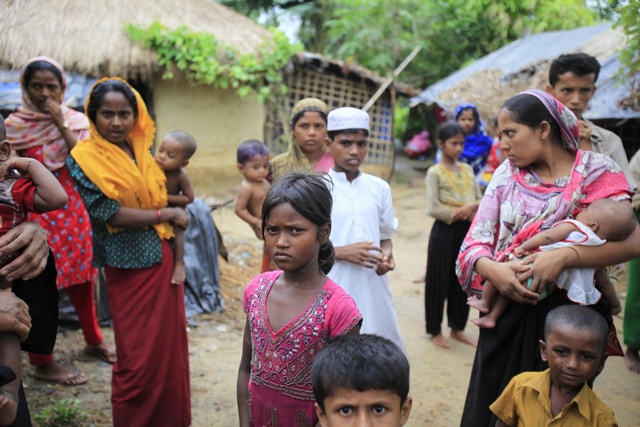Burma’s ethnic Rohingya continue to face heavy persecution in northern Arakan state, despite the dissolution of a controversial border guard force which had been implicated in mass atrocities against the Muslim community.
According to an independent report seen by DVB on Friday, Rohingyas living in the Muslim-majority Buthidaung and Maungdaw townships near the Bangladeshi border have been “subject to a campaign of mass arrest and renewed restrictions” since a wave of clashes with Buddhists in Arakan state last year.
Although Rohingyas in northern Arakan suffered fewer casualties, less segregation and displacement in the violence compared to those in Buddhist-majority regions, abuses against them are of “significant concern” and a climate of harassment and insecurity persists.
Hundreds of Rohingyas, including children, the elderly and four humanitarian workers, continue to be detained since last year’s riots which displaced over 140,000 people across the western state. The vast majority are being held in the notorious Buthidaung prison, where credible reports of “systematic torture” have emerged.
“They have not had access to fair judicial process and many had been tortured before or in jail custody,” warned the report. “While some are still awaiting trial, many were convicted with harsh prison sentences.”
Earlier this week, Buthidaung court sentenced 43 Rohingya detainees to jail terms ranging from six years to life for their alleged role in the violence. It is also alleged that “several truckloads” of Rohingya inmates, including children, were transferred out of the jail in the days preceding the visit of Tomás Ojea Quintana, the UN special Rapporteur, to the area in mid-August. They were reportedly sent back after he left.
This account was confirmed by Shwe Maung, a Rohingya MP from Buthidaung township. “An eyewitness called me before the visit of Mr Quintana and said that about 200 prisoners were moved to Maungdaw and after the visit they were [moved] back,” he told DVB on Friday.
Quintana, who wrapped up a 10-day visit to Burma this week, told DVB that concerns about torture in Buthidaung jail were legitimate.
“I can confirm last year during the violence that hundreds of Muslims in detention were subjected to systematic use of torture,” he said in an exclusive interview. “These are crimes that the government is obliged to investigate and to hold accountable those who are responsible.”
[related]
Meanwhile local sources say that the disbanding of the notorious Nasaka border guard force, which was set up in 1992 to patrol the Bangladeshi border, has only brought “modest improvements” and many Rohingyas view the move as simply “old wine in a new bottle”.
The report notes that while police officers have reduced their reliance on forced labour and eased some local travel restrictions, the collection of arbitrary taxation has skyrocketed. Rickshaw drivers have reported being forced to pay 100 kyat (US$0.10) each time they pass through police checkpoints outside of Maungdaw.
Shwe Maung adds that Rohingyas are still unable to travel between townships, such as Buthidaung and Maungdaw, and workers without travel permits have been arrested at police checkpoints.
“Even though the Nasaka was disbanded, people are still not allowed to move freely, they cannot go freely to Maungdaw, they cannot go freely to Sittwe. So socio-economically, it is very bad,” said Shwe Maung, who represents the military-backed Union Solidarity and Development Party.
After a meeting with Quintana, the Arakan Chief of Police confirmed that anyone found in possession of a Bangladeshi mobile phone or SIM card would be arrested and prosecuted in accordance with existing laws. But he denied that Rohingyas were subject to a two-child limit, as previously affirmed by the Burmese government.
Describing it as a Nasaka “practice”, he added that village administrators would now be in charge of issuing marriage permits, which Rohingya couples are required to obtain. Chris Lewa, head of the Arakan project, said that is too early to assess the long-term impact of the Nasaka’s dissolution, especially relating to the two-child policy but that marriage restrictions were “unlikely” to change.
She added that the main perpetrator of human rights violations and arbitrary arrests was the army, which is exclusively made up of Buddhists. “Nearly all forced labour is now carried out by the military,” said Lewa, who advocates for the rights of Rohingyas.
Locals say there has been a sharp increase in military troops in Maungdaw and Buthidaung, amid news reports that militant pro-Rohingya groups have been active along the border. But Shwe Maung dismissed the reports as “propaganda” intended to stir communal tensions.
President Thein Sein disbanded the Nasaka in mid-July amid heavy international criticisms of its treatment of the Rohingya, who are viewed as illegal Bengali immigrants by the government and denied citizenship in Burma.



